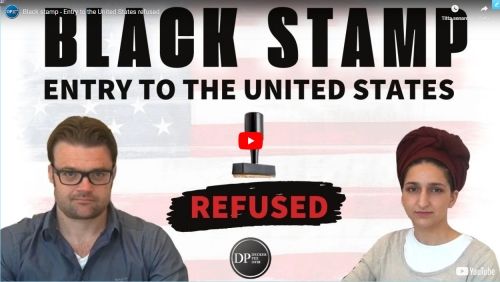Becoming a US citizen comes with many benefits. However, you must meet strict eligibility requirements before you can apply for citizenship. There are two ways to become a US citizen – by birth or through naturalization, which is an option generally open to permanent residents (Green Card holders) that live in the United States.
In this article, written by Michael Decker, one of the founding partners at Decker, Pex, Levi, we will elaborate on the citizenship requirements for Green Card holders, which include, inter alia: being 18 years old or older, living in the US for a specific time period, demonstrating good moral character, being able to speak English, passing a civics test, joining the Selective Service System and passing a an interview with the United States Citizenship and Immigration Services (USCIS). In the end of the naturalization process you will receive a Certificate of Naturalization, which will provide proof of your citizenship status. Stay tuned in as we delve deeper into the eligibility requirements for obtaining a US citizenship and the application process that follows.
How is a Green Card different from US citizenship?
A Green Card holder is an individual who has been granted the legal right to live and work in the United States permanently. While being a Green Card holder has its advantages, it does not provide all the benefits that you would receive as a US citizen. US citizenship goes beyond just having the right to vote; it opens up a world of opportunities. A US citizenship used for various purposes, including obtaining a US passport, applying for government benefits (including healthcare, education, and social security), petitioning for family members to join you in the US, eligibility to work in federal positions and voting in the elections. Furthermore, as a US citizen, you will be exempt from deportation and have the ability to pass down citizenship to your children.
Who is eligible to become a US citizen through naturalization?
The eligibility requirements that you have to meet in order to become a US citizen are:
- Age: you must be at least 18 years old at the time of filing your naturalization application.
- Continuous residence: being a Green Card holder for at least five years prior to your application – or three years if you acquired your Green Card through marriage to a US citizen. If you are engaged in certain kinds of employment abroad, you may be eligible for an exception to the continuous residence requirement.
- Physical presence: during these time periods, you should spend at least 50% of each calendar year in the US -in order to prevent the authorities to claim that your “life center” was not there.
- Language: you must take an English language test to demonstrate that you are able to read, and write basic English. The language component of your naturalization application will combine your naturalization interview in English (see below) with the reading and writing tests: you will be asked about specific answers you provided on your citizenship application as you read them to a USCIS officer, and write read simple sentences dictated to you by the officer.
You are exempt from the English language requirement, if you are 50 years old or older at the time of filing for naturalization and have lived as a Green Card holder in the United States for 20 years OR if you are 55 years old or more at the time of filing for naturalization and have lived as a permanent resident in the United States for 15 years.

You might be exempt from both the language and civics (see below) requirements, if you suffer from a physical or developmental disability or a mental impairment.
- Knowledge in US civics: you must pass a civics test to demonstrate your knowledge of US history, government and culture. The civics test is an oral test, in which a USCIS officer will ask you between up to 10 questions out of a “pool” of 100 civics questions, and you must answer 6 out of 10 questions correctly to pass the test. Please note that the answers to the pool of questions might change due to elections and appointments, so it is important that you know the updated answers to the questions.
- Good moral character: US citizenship is a privilege, and the government wants to ensure that those who will achieve it uphold the country’s values and ideals. The “good moral character” demand is not explicitly defined in US law, and is decided by the USCIS on a case-by-case basis. Applicants for naturalization must demonstrate that they have lived their lives in a way that is consistent with these values, which is proven by their criminal record: when evaluating your moral character, the USCIS looks if you committed crimes that the USCIS defines as serious during the period three or five years prior to their naturalization application (although the USCIS may also consider your conduct prior to that period, to see if your moral character was improved). While certain crimes, such as murder and aggravated felony are considered to be “permanent bars to good moral character”, others are considered as “conditional bars for acts in statutory period”, and you can still be considered having a good moral character, even if you had committed them, since they are not permanent.
In order to prove a good moral character, all male immigrants, between 18 to 26 years of age, are required to register with the Selective Service System (SSS), which is a US government agency that was created to register men for potential military service. You can easily register with the SSS by filling out an online form. If you fail to register with the SSS, you will need to explain why you did not register and provide documentation from the SSS explaining your status. If you can show that you had a good reason for not registering, you may still be eligible for naturalization. However, if you cannot show that you had a good reason, your application for naturalization may be denied.
What are the naturalization requirements if I already served in the US Army?
If you served in the US Armed Forces, you might be exempted from the continuous residence and physical presence requirements, and also from the application fee. If this is relevant to you, please read further information on the USCIS website Naturalization through Military Service.
How do you apply for naturalization, if you meet the US citizenship requirements?
Now that you have determined that you meet the eligibility requirements to apply for US citizenship, it is time to tackle the application process. The process begins with the completion of Form N-400, also known as the Application for Naturalization. You can file the form online or by mail (paper). There is a filing fee. You may file the form within 90 calendar days before you complete your continuous residence requirement.
Do you need to attach documents in order to prove that you meet the citizenship requirements?
Yes, you should attach documents to your application for naturalization, to prove that you meet the eligibility requirements for naturalization. The specific documents you need to attach will depend on your individual circumstances. However, the basic documents that all applicants need to attach include:
- A copy of your Green Card.
- A copy of your marriage certificate (ןf applicable).
- Two passport-style photographs.
Can you attach documents in a foreign language?
If you attach documents in a foreign language to your N-400 application, you must also submit a full English translation of those documents. The translation must be certified by a translator. The translator must attach a certification verifying that the translation is complete and accurate, and that they are competent to translate from the foreign language to English.

What happens after you file Form N-400?
Biometrics services appointment: The USCIS will schedule you for a biometrics appointment, where you will have your fingerprints, signature and photograph taken. There is a fee of $85 for the biometrics appointment. This appointment is typically scheduled within 2-3 months of filing your application.
Naturalization interview and test: Once your biometrics have been processed, you will eventually be scheduled for a naturalization interview with a USCIS officer. During your interview, you will be asked a series of questions about your application and background. You will also undergo the above mentioned English and civics tests.
A US immigration lawyer can be present in the naturalization interview with the USCIS, and assist you. Although the attorney cannot answer any interview questions on your behalf, they can help you prepare for the interview and ensure that your rights are protected. They can also help you understand the questions that will be asked and how to answer them.
Decision: After your naturalization interview, USCIS will make a decision on your application. If your application is approved, you will be scheduled for a naturalization ceremony.
What are the naturalization ceremony and the Oath of Allegiance?
After you have shown that you fulfill all the US citizenship requirements, the final step is the naturalization ceremony, in which you will take the Oath of Allegiance to the United States together with other individuals who have successfully completed the naturalization process. An authorized official, such as a judge or USCIS officer, presides over the ceremony and administers the Oath of Allegiance. Applicants are typically asked to stand and raise their right hand.
By taking the Oath of Allegiance, you will renounce all allegiance and fidelity to any foreign prince, potentate, state, or sovereignty, and swear to support and defend the Constitution and laws of the United States. The content of the oath is the following:
“I hereby declare, on oath, that I absolutely and entirely renounce and abjure all allegiance and fidelity to any foreign prince, potentate, state, or sovereignty, of whom or which I have heretofore been a subject or citizen; that I will support and defend the Constitution and laws of the United States of America against all enemies, foreign and domestic; that I will bear true faith and allegiance to the same; that I will bear arms on behalf of the United States when required by the law; that I will perform noncombatant service in the Armed Forces of the United States when required by the law; that I will perform work of national importance under civilian direction when required by the law; and that I take this obligation freely, without any mental reservation or purpose of evasion; so help me God.”
Once the oath is completed, each individual is presented with a Certificate of Naturalization, officially recognizing them as US citizens. This certificate is an important legal document, which officially grants you US citizenship.
Congratulations! You are now a US citizen!
What is the Certificate of Naturalization that you receive in the end of the naturalization process in the US?
The Certificate of Naturalization is an official document issued by the US government to foreign nationals who have successfully completed the process of becoming naturalized US citizens. It serves as proof of US citizenship for individuals who were not born in the United States or did not acquire citizenship through birthright.
Start your naturalization process today by contacting a professional and experienced immigration lawyer
The application process for US citizenship may seem overwhelming, and therefore it is important if you are considering naturalizing in the USA, it is important to consult with an US immigration lawyer to discuss your individual circumstances and to see if you meet the US citizenship requirements. A US immigration lawyer is familiar with the latest immigration laws and regulations, and will be able to help you navigate the complex naturalization process, including gathering the necessary documentation and making sure that they are properly prepared
Our law firm, which has offices in Jerusalem and Tel Aviv, specializes in US immigration laws and has a dedicated immigration team to assist you with your application for naturalization in the United States. We will be happy to be at your service and assist you in everything related to the issue. You are more than welcome to contact us using the phone number or email address listed below.
The article was written in collaboration with attorney Adam Jonsson.













